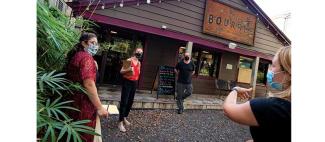“Where y’at, dawlin’?”
I chuckle to myself as I write that. This greeting, quintessential in some New Orleans neighborhoods, does not roll easily off my tongue. As you may have read in this issue of the Tulanian, two professors are exploring the evolution of speech patterns in New Orleans, which are surely among the most fascinating in the world. But NOLA is not alone. My birthplace of Philadelphia is famous for its own linguistical flourishes.
But, besides idiosyncratic language styles, another thing almost all great cities have in common is the presence of a great university. Urban universities are defined by the cities they call home and cities with great universities are set apart by their vitality, innovation, originality and diversity. But like that fictional Philadelphian, Rocky Balboa, it now feels like our cities are on the ropes, hit hard by COVID-19. During this pandemic, it seems that the best things about cities — dense populations and the synergy and connections they foster — become liabilities. Practical things, like conventions, and the fun things, like festivals, became potential superspreaders.































































